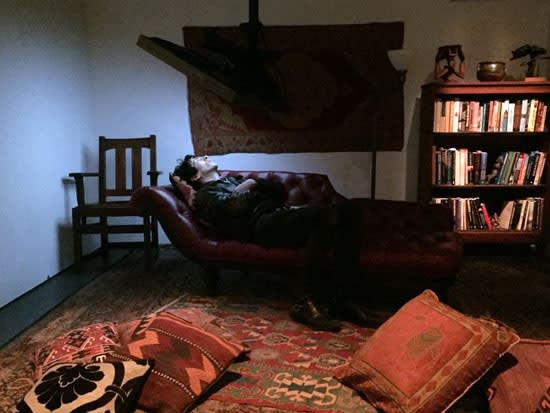Mary Lucier, who has long worked at the intersection of music and the visual arts, weaves together past and present for her current video installations at the Kitchen, which is marking its forty-fifth anniversary with a series of events and exhibitions. Color Phantoms with Automatic Writing commemorates Lucier’s friend and collaborator, composer Robert Ashley, who died in 2014 and whose production with choreographer Steve Paxton, Quicksand, was concurrently featured on the Kitchen’s stage earlier this month. Revisiting works going back to 1971, Lucier draws on editing techniques of layering and displacement to provide an elegant frame for the Kitchen’s celebration of multimedia research.
Lucier literally introduces the Kitchen’s current programs, with a four-channel work in the theater lobby and a more elaborate installation at the entrance to the second floor gallery. Richly furnished with memorabilia, the upstairs entry recreates the waiting room of a psychoanalyst, with plain wooden chairs randomly arranged in front of a projected video of Ashley in his studio. Layering past and present, Lucier inflects this footage with a sense of loss, covering the projection in a luminous scrim of pixillated snow that evokes its distance in time. An oriental rug that once belonged to Dorothea Tanning leads into the adjoining “office”. Here, where the business of analysis focuses on the recovery of the subconscious, more rugs and cushions create a sense of oriental luxury, while the furnishings, modeled on those of Freud’s office, evoke the era of surrealism: a bookcase of esoteric texts, ethnographic artifacts, and artworks by Max Ernst, Tanning’s husband, set psychoanalysis itself in a distant temporal realm.

